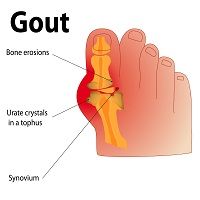Article
People with Gout Not As Likely to Develop Alzheimer's Disease
Author(s):
Researchers report that gout may actually have a neuroprotective effect and reduce the risk of developing Alzheimer's disease by as much as 24 percent.

Researchers report that gout may have a protective effect for the brain and reduce the risk of developing Alzheimer’s disease.
According to study results published in Annals of the Rheumatic Diseases, the antioxidant effects of uric acid may have neuroprotective benefits, making gout inversely associated with the risk of developing Alzheimer’s disease.
Researchers from the Division of Rheumatology, Allergy, and Immunology at Massachusetts General Hospital, and Boston University Medical Center analyzed data from The Health Improvement Network (THIN), an “an electronic medical record database from general practices that is representative of the UK general population,” according to a news release that accompanied publication of the study results.
They reviewed data from electronic medical records of 3.7 million people age 40 and older (none of whom had gout or any dementia prior to the start of follow-up) to evaluate the potential impact of gout on the risk of developing Alzheimer's disease. For the study, they matched up to 5 non-gout patients by age, sex, year of study enrollment, and BMI for each patient with incident gout. Patients were followed “until they developed Alzheimer's disease, died, left the THIN database or the follow-up ended, whichever came first.”
After adjusting for smoking, alcohol use, physician visits, social deprivation index, comorbidities and medication use, the researchers reported that they identified “309 new cases of AD among 59,224 patients with gout (29% female, mean age 65 years) and 1942 cases among 238,805 in the comparison cohort over a 5-year median follow up (1.0 vs. 1.5 per 1000 person-years, respectively).”
This correlated with a 24% lower risk of Alzheimer’s disease among patients with a history of gout.
The authors said these findings provide “the first population-based evidence for the potential protective effect of gout” on the risk of Alzheimers' disease, and “support the purported neuroprotective role of uric acid.”





